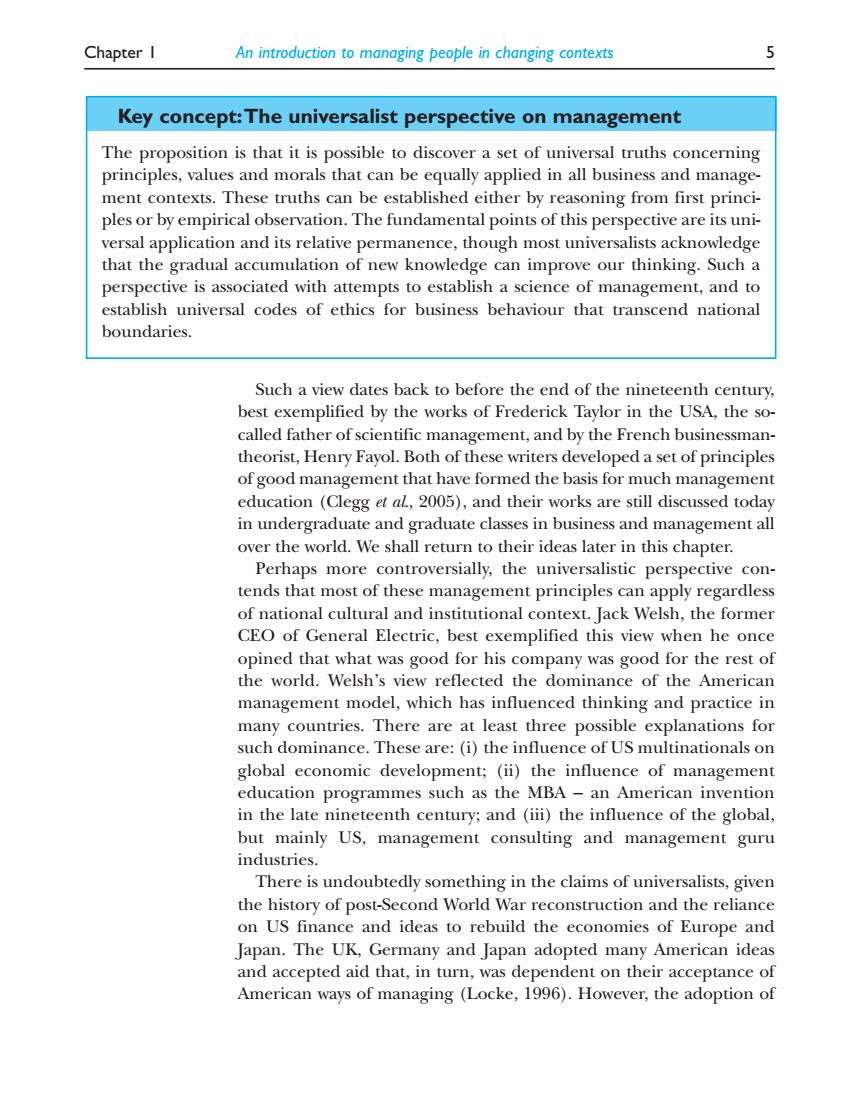正在加载图片...

Chapter I An introduction to managing people in changing contexts Key concept:The universalist perspective on management The proposition is that it is possible to discover a set of universal truths concerning principles,values and morals that can be equally applied in all business and manage- ment contexts.These truths can be established either by reasoning from first princi- ples or by empirical observation.The fundamental points of this perspective are its uni versal application and its relative permanence,though most universalists acknowledge that the gradual accumulation of new knowledge can improve our thinking.Such a perspective is associated with attempts to establish a science of management,and to establish universal codes of ethics for business behaviour that transcend national boundaries. Such a view dates back to before the end of the nineteenth century best exemplified by the works of Frederick Taylor in the USA,the so- called father of scientific management,and by the French businessman- theorist,Henry Fayol.Both of these writers developed a set of principle of good management that have formed the basis for much management education(Clegg et al,2005),and their works are still discussed today in undergraduate and graduate classes in business and management al over the world.We shall return to their ideas later in this chapter. Perhaps more controversially,the universalistic perspective con tends that most of these management principles can apply regardless of national cultural and institutional context.Jack Welsh,the former CEO of General Electric,best exemplified this view when he once opined that what was good for his company was good for the rest of the world.Welsh's view reflected the dominance of the American management model,which has influenced thinking and practice in many countries.There are at least three possible explanations for such dominance.These are:(i)the influence of US multinationals on global economic development;(ii)the influence of management education programmes such as the MBA-an American invention in the late nineteenth century;and (iii)the influence of the global, but mainly US,management consulting and management guru industries. There is undoubtedly something in the claims of universalists,given the history of post-Second World War reconstruction and the reliance on US finance and ideas to rebuild the economies of Europe and Japan.The UK,Germany and Japan adopted many American ideas and accepted aid that,in turn,was dependent on their acceptance of American ways of managing (Locke,1996).However,the adoption ofSuch a view dates back to before the end of the nineteenth century, best exemplified by the works of Frederick Taylor in the USA, the socalled father of scientific management, and by the French businessmantheorist, Henry Fayol. Both of these writers developed a set of principles of good management that have formed the basis for much management education (Clegg et al., 2005), and their works are still discussed today in undergraduate and graduate classes in business and management all over the world. We shall return to their ideas later in this chapter. Perhaps more controversially, the universalistic perspective contends that most of these management principles can apply regardless of national cultural and institutional context. Jack Welsh, the former CEO of General Electric, best exemplified this view when he once opined that what was good for his company was good for the rest of the world. Welsh’s view reflected the dominance of the American management model, which has influenced thinking and practice in many countries. There are at least three possible explanations for such dominance. These are: (i) the influence of US multinationals on global economic development; (ii) the influence of management education programmes such as the MBA – an American invention in the late nineteenth century; and (iii) the influence of the global, but mainly US, management consulting and management guru industries. There is undoubtedly something in the claims of universalists, given the history of post-Second World War reconstruction and the reliance on US finance and ideas to rebuild the economies of Europe and Japan. The UK, Germany and Japan adopted many American ideas and accepted aid that, in turn, was dependent on their acceptance of American ways of managing (Locke, 1996). However, the adoption of Chapter 1 An introduction to managing people in changing contexts 5 Key concept:The universalist perspective on management The proposition is that it is possible to discover a set of universal truths concerning principles, values and morals that can be equally applied in all business and management contexts. These truths can be established either by reasoning from first principles or by empirical observation. The fundamental points of this perspective are its universal application and its relative permanence, though most universalists acknowledge that the gradual accumulation of new knowledge can improve our thinking. Such a perspective is associated with attempts to establish a science of management, and to establish universal codes of ethics for business behaviour that transcend national boundaries